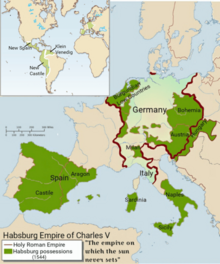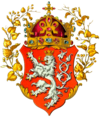Anne of Bohemia and Hungary
| Anne of Bohemia and Hungary | |
|---|---|
 Portrait by Hans Maler, c. 1519 | |
| Queen of the Romans | |
| Tenure | 5 January 1531 – 27 January 1547 |
| Queen consort of Hungary, Bohemia and Croatia | |
| Tenure | 1526 – 27 January 1547 |
| Archduchess consort of Austria | |
| Tenure | 25 May 1521 – 27 January 1547 |
| Born | 23 July 1503 Buda, Kingdom of Hungary |
| Died | 27 January 1547 (aged 43) Prague, Kingdom of Bohemia, Holy Roman Empire |
| Burial | |
| Spouse | |
| Issue |
|
| House | Jagiellon |
| Father | Vladislaus II of Hungary |
| Mother | Anne of Foix-Candale |
Anna of Bohemia and Hungary (23 July 1503 – 27 January 1547),[1] sometimes known as Anna Jagellonica, was Queen of Germany, Bohemia, and Hungary and Archduchess of Austria as the wife of King Ferdinand I (later Holy Roman Emperor).
Early life
[edit]She was the oldest child and only daughter of King Vladislaus II of Bohemia and Hungary (1456–1516) and his third wife Anne of Foix-Candale.[2] King Louis II of Hungary and Bohemia was her younger brother. Her paternal grandparents were King Casimir IV of Poland (of the Jagiellon dynasty) and Elisabeth of Austria, one of the heiresses of the Kingdom of Bohemia, the Duchy of Luxembourg and the Duchy of Kuyavia. Her maternal grandparents were Gaston de Foix, Count of Candale, and Catherine de Foix, an Infanta of the Kingdom of Navarre.[1]
Anne was born in Buda (now Budapest). The death of Vladislaus II on 13 March 1516 left both siblings in the care of the Holy Roman Emperor Maximilan I. It was arranged for Anna to marry his grandson, Archduke Ferdinand of Austria, second son of Queen Regnant Joanna of Castile and her late husband and co-ruler, Philip I of Castile. Anna and Mary moved first to Vienna, and then to Innsbruck. Maximilian rarely visited, but he sent his hunter home to instruct the two girls in the art of hunting. There was emphasis on their abilities to handle weapons and other physical skills. The Humanist education they enjoyed focused on problem-solving skills. They were also instructed in dancing, music, and came in contact with many humanists visited the imperial library there. Innsbruck was also home to a great weapon arsenal and a growing armament industry built by the emperor.[3] Anna married Ferdinand on 26 May 1521 in Linz, Austria.[2] At the time, Ferdinand was governing the Habsburg hereditary lands on behalf of his older brother Charles V, Holy Roman Emperor. It was stipulated that Ferdinand should succeed Anne's brother Louis in case he died without legitimate male heirs.
Queen of Bohemia and Hungary
[edit]

Louis died without a legitimate male heir after he was thrown from his horse at the conclusion of the Battle of Mohács against Suleiman the Magnificent of the Ottoman Empire on 29 August 1526. This left the thrones of both Bohemia and Hungary vacant. Ferdinand claimed both kingdoms and was elected king of Bohemia on 24 October of the same year with Anne as his queen.
Hungary was a more difficult case, as Suleiman had annexed much of its lands. Ferdinand was proclaimed king of Hungary by a group of nobles, but another faction of Hungarian nobles refused to allow a foreign ruler to hold that title and elected John Zápolya as an alternative king. The resulting conflict between the two rivals and their successors lasted until 1570 when John's son John Sigismund gave up the title king of Hungary in favor of Ferdinand's son Maximilian as part of the terms of the Treaty of Speyer. In 1531, Ferdinand's older brother Charles V decided Ferdinand would be his successor as Holy Roman Emperor, and Ferdinand was elected to the title King of the Romans.
Anne was entrusted by her husband with many responsibilities. During his stay in Brussels, she was appointed as Regent (Statthalterin). Together with the Bishop of Trieste, she was the Chair of his Hofrat (Court Council). In her husband's name, she presided over many Diets. She became famous for her charity and wisdom.[4]
Ferdinand at first seemed to suffer from a lack of premarital experience, but in the end the marriage proved extremely successful both personally and politically.[5] Anna and Ferdinand had fifteen children, all of whom were born in Bohemia or Austria. The kingdoms of both Bohemia and Hungary had suffered for centuries from premature deaths among heirs and a shortage of succession prospects, a predicament resolved by Anne's impressive fertility. Meanwhile, Anna served as Queen Consort of Bohemia and as one of three living Queens of Hungary until her death. She died in Prague, days after giving birth to her last daughter Joanna.[1] In 1556, Charles V abdicated and Ferdinand succeeded as emperor, nine years after Anna's death. After Anna died, Ferdinand was advised to remarry several times by people around him, but he could not forget his wife and never remarried.
During Anna's life, her husband expanded the Castle of Linz to offer her more security in times of war. The Belvedere ("Queen Anne's Summer Palace"), one of the most beautiful buildings in Prague, was built for her on the grounds of Prague Castle starting in 1538.[6] It was not completed in its present form until 1565, long after her death.
Children
[edit]| Name | Birth | Death | Notes |
|---|---|---|---|
| Elisabeth | 9 July 1526 | 15 June 1545 | Married the future King Sigismund II Augustus of Poland; no issue |
| Maximilian | 31 July 1527 | 12 October 1576 | Married his first cousin Maria of Spain; had issue |
| Anna | 7 July 1528 | 16–17 October 1590 | Married Albert V, Duke of Bavaria; had issue |
| Ferdinand | 14 June 1529 | 24 January 1595 | Married Philippine Welser; had issue; married his niece Anne Juliana Gonzaga; had issue |
| Maria | 15 May 1531 | 11 December 1581 | Married Wilhelm, Duke of Jülich-Cleves-Berg; had issue |
| Magdalena | 14 August 1532 | 10 September 1590 | A nun |
| Catherine | 15 September 1533 | 28 February 1572 | Married King Sigismund II Augustus of Poland; no issue |
| Eleanor | 2 November 1534 | 5 August 1594 | Married William I, Duke of Mantua; had issue |
| Margaret | 16 February 1536 | 12 March 1567 | A nun |
| John | 10 April 1538 | 20 March 1539 | Died in childhood |
| Barbara | 30 April 1539 | 19 September 1572 | Married Alfonso II d'Este; no issue |
| Charles | 3 June 1540 | 10 July 1590 | Married his niece Maria Anna of Bavaria; had issue (including Holy Roman Emperor Ferdinand II) |
| Ursula | 24 July 1541 | 30 April 1543 | Died in childhood |
| Helena | 7 January 1543 | 5 March 1574 | A nun |
| Joanna | 24 January 1547 | 10 April 1578 | Married Francesco I de' Medici, Grand Duke of Tuscany; had issue |
Ancestry
[edit]| Ancestors of Anne of Bohemia and Hungary | |||||||||||||||||||||||||||||||||||||||||||||||||||||||||||||||||||||||||||||||||||||||||||||||||||||||||||||||||||||||||||||||||||||||||||||||||||||||||||||||||||||||||||||||||||||||||||||||||||||||||||||||||||||||||||||||||||||||||||||||||||||||||||||||||||||||||||||||||||||||||
|---|---|---|---|---|---|---|---|---|---|---|---|---|---|---|---|---|---|---|---|---|---|---|---|---|---|---|---|---|---|---|---|---|---|---|---|---|---|---|---|---|---|---|---|---|---|---|---|---|---|---|---|---|---|---|---|---|---|---|---|---|---|---|---|---|---|---|---|---|---|---|---|---|---|---|---|---|---|---|---|---|---|---|---|---|---|---|---|---|---|---|---|---|---|---|---|---|---|---|---|---|---|---|---|---|---|---|---|---|---|---|---|---|---|---|---|---|---|---|---|---|---|---|---|---|---|---|---|---|---|---|---|---|---|---|---|---|---|---|---|---|---|---|---|---|---|---|---|---|---|---|---|---|---|---|---|---|---|---|---|---|---|---|---|---|---|---|---|---|---|---|---|---|---|---|---|---|---|---|---|---|---|---|---|---|---|---|---|---|---|---|---|---|---|---|---|---|---|---|---|---|---|---|---|---|---|---|---|---|---|---|---|---|---|---|---|---|---|---|---|---|---|---|---|---|---|---|---|---|---|---|---|---|---|---|---|---|---|---|---|---|---|---|---|---|---|---|---|---|---|---|---|---|---|---|---|---|---|---|---|---|---|---|---|---|---|---|---|---|---|---|---|---|---|---|---|---|---|---|---|---|---|
| |||||||||||||||||||||||||||||||||||||||||||||||||||||||||||||||||||||||||||||||||||||||||||||||||||||||||||||||||||||||||||||||||||||||||||||||||||||||||||||||||||||||||||||||||||||||||||||||||||||||||||||||||||||||||||||||||||||||||||||||||||||||||||||||||||||||||||||||||||||||||
References
[edit]- ^ a b c Henry Gardiner Adams, ed. (1857). "Anna of Hungary". A Cyclopaedia of Female Biography: 45. Wikidata Q115749214.
- ^ a b Previte-Orton 1962, p. 922.
- ^ Royen, Laetitia V. G. Gorter-Van (1995). Maria van Hongarije, regentes der Nederlanden: een politieke analyse op basis van haar regentschaps-ordonnanties en haar correspondentie met Karel V (in Dutch). Uitgeverij Verloren. pp. 41, 59–66, 373. ISBN 978-90-6550-394-7. Retrieved 15 December 2021.
- ^ Korotin, Ilse (19 May 2016). biografiA: Lexikon österreichischer Frauen (in German). Böhlau Verlag Wien. p. 126. ISBN 978-3-205-79590-2. Retrieved 15 December 2021.
- ^ Kohler, Alfred (2003). Ferdinand I., 1503-1564: Fürst, König und Kaiser (in German). C.H.Beck. pp. 96, 97. ISBN 978-3-406-50278-1. Retrieved 15 December 2021.
- ^ Korotin 2016, p. 126.
- ^ a b Priebatsch, Felix (1908), "Wladislaw II.", Allgemeine Deutsche Biographie (in German), vol. 54, Leipzig: Duncker & Humblot, pp. 688–696
- ^ a b c d e f Noubel, P., ed. (1877). Revue de l'Agenais [Review of the Agenais]. Vol. 4. Société académique d'Agen. pp. 496–497.
- ^ a b Casimir IV, King of Poland at the Encyclopædia Britannica
- ^ a b Wurzbach, Constantin von, ed. (1860). . Biographisches Lexikon des Kaiserthums Oesterreich [Biographical Encyclopedia of the Austrian Empire] (in German). Vol. 6. p. 167 – via Wikisource.
Sources
[edit]- Henry Gardiner Adams, ed. (1857). "Anna of Hungary". A Cyclopaedia of Female Biography: 45. Wikidata Q115749214.
- Previte-Orton, C.W. (1962). The Shorter Cambridge Medieval History. Vol. II. Cambridge at the University Press.
External links
[edit]![]() Media related to Anna of Bohemia and Hungary at Wikimedia Commons
Media related to Anna of Bohemia and Hungary at Wikimedia Commons
- 1503 births
- 1547 deaths
- 16th-century German people
- 16th-century German women
- 16th-century Hungarian nobility
- 16th-century Hungarian women
- 16th-century Italian nobility
- Queens consort of Bohemia
- Deaths in childbirth
- Queens of the Romans
- Queens consort of Hungary
- Jagiellonian dynasty
- Nobility from Prague
- Burials at St. Vitus Cathedral
- Daughters of kings
- Mothers of Holy Roman Emperors
- Mothers of Austrian monarchs
- Mothers of Bohemian monarchs
- Mothers of Hungarian monarchs
- Mothers of German monarchs

